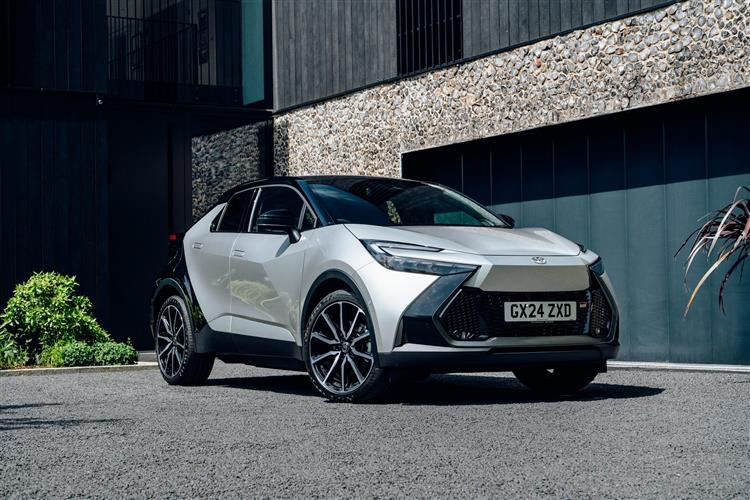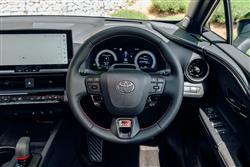PLUG, PLAY & CONTROVERSY (some text hidden) --NONE--
By Jonathan Crouch
Is it really necessary to have PHEV power in a Toyota C-HR? Jonathan Crouch drives it.
Ten Second Reviewword count: 45
Top versions of the second generation C-HR gain the PHEV powertrain Toyota thought unnecessary in this small coupe-crossover model's original predecessor. You could almost treat the resulting confection like a full-EV for commuting duties, but inevitably, there's a price to pay for the extra sophistication.
Backgroundword count: 156
Toyota's always seemed very undecided about PHEV technology. Having virtually invented it back in 2012 for a top version of the Prius, it took nearly another decade for the brand to offer it again on another model (the RAV4). Questions to the company as to why smaller Toyotas couldn't be had with Plug-in Hybrid tech were met with the response that the benefits of PHEV were "largely illusory" and that a better solution was to concentrate on conventional Hybrids. But everyone's allowed to change their mind and Toyota clearly has in developing the second generation C-HR crossover we're looking at here, which now has a headlining PHEV model at the top of its line-up. Most sales will continue to be of the self-charging conventional Hybrid versions of this model, but let's take a closer look at whether plugging your C-HR in might be a credible option if you're planning to spend big on this model line.
Driving Experienceword count: 265
Most PHEVs actually aren't very efficient at all, once their EV range is used up. When that happens, they usually revert to a conventional petrol engine made even less efficient by the fact that it has to lug along the extra weight of a Plug-in Hybrid battery pack. The C-HR PHEV has that too, but at least its core petrol engine is a self-charging full-Hybrid, which makes it rather unique amongst models of this genre. The 2.0-litre engine in question (borrowed from the faster of the two standard Hybrid models) is mated to a 161bhp electric motor powered by a 13.6kWh battery that, when fully charged, can offer an EV range of up to 41 miles. Only the front wheels are driven - with up to 220bhp, which allows 62mph to be dispatched in 7.4s en route to 112mph. To cope with the extra power (and weight), Toyota has added new twin-piston brakes and new ZF frequency-sensitive shock absorbers supposed to improve the ride over high-frequency bumps. There are three driving modes and you can alter the strength of regenerative braking right up to a 'B' setting that offers so much retardation off-throttle that you hardly ever need to use the brake pedal. As with the ordinary Hybrid versions of this second generation C-HR, Toyota says it's worked on the handling, introducing a wider track and tweaking multi-link rear suspension elements from the larger RAV4. It all sits on the company's usual TNGA-C platform, borrowed from the Corolla. And Toyota says that it's improved auto gearbox response too, though you shouldn't expect too much there.
To see the full road test text contact us on 0330 0020 227
Pictures (high res disabled)

.jpg)
|
.jpg)
|
.jpg)
| |||
.jpg)
|
.jpg)
|
.jpg)
| |||
.jpg)
|
.jpg)
|
.jpg)
| |||
.jpg)
|
.jpg)
|
.jpg)
| |||

|
Statistics (subset of data only)
Min |
Max |
|
Price: |
£39,145.00 (At 17 Jun 2024, Design) |
£43,540.00 (At 17 Jun 2024, GR Sport) |
CO2 (g/km): |
19 |
|
Max Speed (mph): |
112 |
|
0-62 mph (s): |
7.4 |
|
Electric WLTP-Rated Driving Range (miles): |
41 |
|
Combined Mpg: |
353.1 |
|
Length (mm): |
4362 |
|
Width (mm): |
1832 |
|
Height (mm): |
1564 |
|
... and 3 other stats available | ||
Scoring (subset of scores)
Category: Hybrid, Plug-in, Electric & Hydrogen
| Performance | |
| Handling | |
| Comfort | |
| Space | |
| Styling, Build, Value, Equipment, Depreciation, Handling, Insurance and Total scores are available with our full data feed. | |



